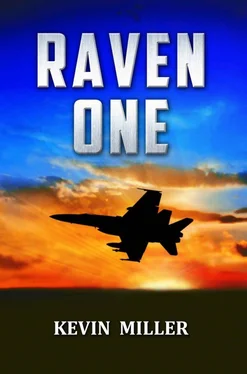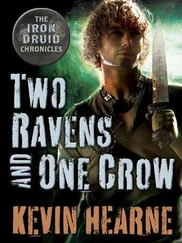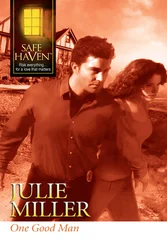“Yes, sir, it is,” he replied. “What is it?”
The “spy” answered. “It’s the Mikoyan Project 1.44, also known as the MiG-35. It’s a fifth-generation technology demonstrator designed and built by the Russians in the late 90s. The NATO designation is Flatpack . Stealth design, two big engines, 1-to-1 thrust to weight, supercruise, thrust vectoring. Russia built five of them, but rejected the design because of the poor radar in the nose and low airframe g loading. Little power out and low range — they rely too much on GCI control. And, despite the large fuselage, it’s fuel limited. Hariri launched with half a fuel load anyway, like all the Iranians do.”
Wilson looked puzzled. “Hariri? Who’s Hariri, sir?” he asked.
“Their wing commander, a colonel,” Admiral Smith said. “You fought him.” Wilson absorbed the information, and recalled the pilot’s eyes. The eyes had a name… Colonel Hariri.
The Intel Officer continued. “He’s the wing commander at Shiraz. Our dossier says he flew Tomcats in the Iran-Iraq War and got three kills.”
Smith waved his hand and cut him off. “What happened postmerge?” he asked Wilson.
“Sir, we went one-circle,” Wilson said, “and I pulled inside him. I had angles at the second merge and pulled hard across his six, but he just stopped . Just stood on the cans and stopped in midair. He then did a cobra-like maneuver and flushed me out in front. Incredible. He took a snapshot that just missed low. Then we spiraled down to the deck. I had an opportunity to extend and got down into the weeds. He never took that second missile shot, and I figured it was hung. He chased me a bit down low, but I reversed. He then pitched out of the fight and headed to the northeast, probably back to Shiraz, if that’s where he’s from.”
Wilson looked directly at the admiral to ask about Prince. “Sir, the vis was great, and I never saw a chute. But do we have definitive proof he’s dead?”
Smith looked at Cajun and CAG, then back at Wilson. “That’s what Washington says. And your eyewitness account seems to confirm it. We tend to think he didn’t survive, but — for now — he’s officially missing . We’re workin’ it, with Washington’s help.” He then changed the subject.
“Jim, again, superb job staying with Howard and trying to save him. And your survival against this Flatpack was eye-watering, not to mention your driving the join-up with Texaco to save your jet. The phones and e-mail are turned off now due to this ruckus, but I want you to call home to your wife. Gene, set that up, please.”
“Yes, sir,” Swartzmann replied, scribbling something in his notebook.
Smith drew closer to Wilson. “Lieutenant Howard is missing and we are searching for him. Tell your wife that. Tell her you are safe, and we’re not going to fly tonight. She’ll sleep soundly after hearing your voice.”
“Thank you, sir.”
“Then go to CVIC for a debrief and write your statement. Then get some food and rest. Got it?” the admiral asked with a wink.
“Aye, aye, sir.” Wilson said.
“CAG? Skipper?” Smith asked each of Wilson’s superiors.
“As ordered, sir,” CAG Swoboda answered, and Cajun nodded in the affirmative.
“Good,” Smith said with a smile, as he grabbed Wilson’s arm. “ Good job, good job, ” he whispered to him before leaving.
Wilson then looked at Swartzmann who nodded for him to follow. Wilson was led into the flag staff office, and Swartzmann ordered one of the staff officers to set up a SATCOM line. Wilson wrote his number on a piece of paper for the officer, who was curious about why this pilot was receiving a special privilege. The officer dialed and handed Wilson the phone once it rang. Wilson looked at his watch — almost 0500 there. After two rings, Mary answered, still half asleep.
“ Hellooo? ”
“Mary.”
“James? James , is that you?”
“Yeah, baby,” Wilson answered self-consciously, as he looked up at Swartzmann’s unsmiling face.
She exhaled. “You’re calling so early … I need my…”
“Mary… Mary?”
“What…?”
“Mary… something’s happened.”
Colonel Reza Hariri, a colonel in the Islamic Republic of Iran Air Force, lay on his back, awake in the darkness. He listened to the low tones of the muezzin from the minaret three blocks away as he summoned the people for fard salah , the first of five calls to prayer. Off in a different part of the city he could hear the faint sounds of another muezzin call the Shiite faithful to prayer. The mournful lines of the Adhan from that other minaret were broadcast across a scratchy loudspeaker.
For almost every morning of his 48 years, Hariri’s brain had absorbed the message of the Holy Men chanting in Arabic… a language he little understood. He did know most of the meaning of the morning call to prayer: I bear witness that there is no deity except God. Make haste towards prayer. There is no deity except God.
He looked out the window at the mountain ridge to the east, outlined by a dim glow provided by a sun that would not spill over and upon the Iranian city of Shiraz for about two hours. He glanced at the alarm clock LCD display: 4:40. He’s late today, he thought.
Hariri would have enjoyed the extra 10 minutes of sleep, but he had been awake all night, reliving yesterday morning’s fight. He couldn’t get the image out of his head: the American was right there , out of airspeed and inverted, almost hovering in the sky in front of him — less than a soccer pitch away. The F-18 had filled his windscreen as Hariri’s nose tracked down to cut him in half with a cannon burst. His pipper was well above the Hornet when he squeezed the trigger — and nothing! Nothing for a split second until Hariri’s nose fell, and he missed low. No! He didn’t miss — it was the damned Russian aircraft and the inferior weapons system! How he wished for his beloved F-14 at that point, with a reliable gun and accurate sight.
As the Wing Commander of the IRIAF base at Shiraz, Sarhang Hariri happened to be inspecting the strip alert facility when the call had come in that American fighters were crossing the coast. A young sargord scrambled for the MiG-35, but Hariri stopped him, grabbed his helmet and ordered him to remove his g-suit, which fit Hariri to an acceptable level. Within minutes, Hariri had the MiG taxiing for the runway and his rendezvous with destiny. I was meant to be here, he thought.
His mind wandered to his last guns kill, an execution really. Winter of 1988, northwest of Kharg Island. A lone Iraqi Mirage returning to Iraq flew in front of Hariri and his wingman moments after Hariri had shot down another F-1 with a Sidewinder, causing the Arab to spin out of control into the white cloud layer below.
He saw the Mirage a few miles ahead, crossing left to right off his nose and low. The fighter was just cruising along straight and level after its own attack on a tanker, oblivious to both the destruction of his countryman seconds earlier and the presence of his assailant now coming out of the sun. With calm resolve, Hariri rolled in behind him, pulled power and popped the speedbrakes while Hariri’s useless radar intercept officer cried “ God is great!” over the intercom.
“Shut up and look for the enemy,” Hariri scolded him. He lined his Tomcat up on the Iraqi’s 6 o’clock — he still hadn’t budged — and squeezed the trigger from 200 meters behind. He saw the first 20mm tracers hit the fuselage; massive yellow flames and black smoke erupted from the fuselage and wings. Hariri overtook the fighter as it slowed in its death throes — now covered in flames. He saw inside the cockpit and watched as the pilot’s arms frantically reached for the ejection seat face curtain through the fire. He was being burned alive. The canopy then blew off and flames poured out of the cockpit into the slipstream, followed in an instant by the ejection seat and pilot exploding from the inferno — completely engulfed. Hariri watched the fireball, now a flaming arc, pick up speed and rate of descent as it disappeared into the same undercast as his mate moments earlier. Despite two aerial victories inside three minutes, Hariri could not erase the sickening image of the burning pilot from his mind. Once he crossed into a safe area south of Kharg, he wretched into his glove.
Читать дальше












